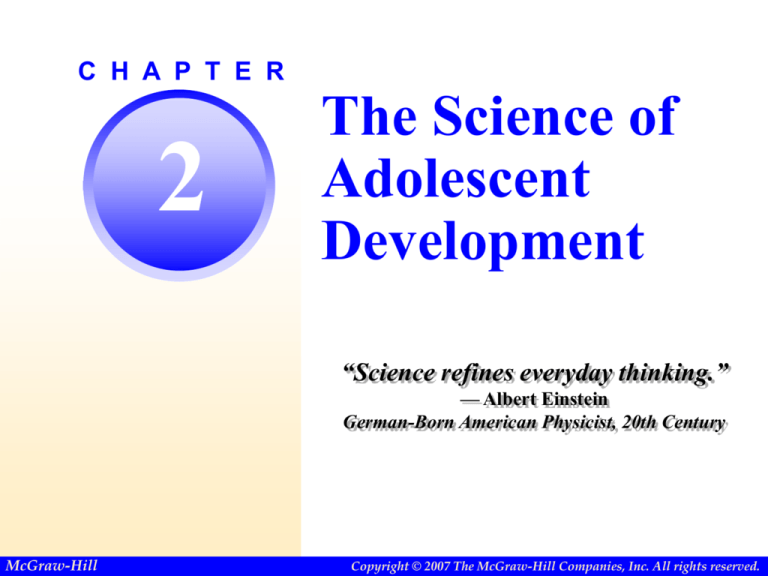
C H A P T E R
2
The Science of
Adolescent
Development
Chapter Title
“Science refines everyday thinking.”
— Albert Einstein
German-Born American Physicist, 20th Century
McGraw-Hill
Copyright © The McGraw-Hill Companies,Copyright
Inc. Permission
for reproduction
or display.
© 2007required
The McGraw-Hill
Companies,
Inc. All rights reserved.
2
The Scientific Method
• Conceptualize the problem
• Collect information (data)
• Analyze data
• Draw conclusions
McGraw-Hill
Copyright © 2007 The McGraw-Hill Companies, Inc. All rights reserved.
3
Theory
• An interrelated, coherent set of ideas
that helps to explain and make
predictions
McGraw-Hill
Copyright © 2007 The McGraw-Hill Companies, Inc. All rights reserved.
4
Hypothesis
• Specific assumptions and
predictions that can be tested
McGraw-Hill
Copyright © 2007 The McGraw-Hill Companies, Inc. All rights reserved.
5
Psychoanalytic theories
• Freud
Personality Structure
Id
McGraw-Hill
Ego
Superego
Copyright © 2007 The McGraw-Hill Companies, Inc. All rights reserved.
6
Psychoanalytic
Freud
– Defense Mechanisms
• Unconscious methods the ego uses to
distort reality and protect itself from anxiety
• Examples: Repression and Regression
McGraw-Hill
Copyright © 2007 The McGraw-Hill Companies, Inc. All rights reserved.
7
Psychoanalytic
Freud
Fig. 2.1
McGraw-Hill
Copyright © 2007 The McGraw-Hill Companies, Inc. All rights reserved.
8
Psychoanalytic
Revisions of Freud’s Theories
– Less emphasis on sexual motivations
– More emphasis on social aspirations
McGraw-Hill
Copyright © 2007 The McGraw-Hill Companies, Inc. All rights reserved.
9
Psychoanalytic
Fig. 2.3
McGraw-Hill
(Continued…)
Copyright © 2007 The McGraw-Hill Companies, Inc. All rights reserved.
10
Psychoanalytic
McGraw-Hill
(Continued from previous slide)
Copyright © 2007 The McGraw-Hill Companies, Inc. All rights reserved.
11
Cognitive
Piaget
Fig. 2.4
McGraw-Hill
Copyright © 2007 The McGraw-Hill Companies, Inc. All rights reserved.
12
Cognitive
Vygotsky
– Cognitive skills can be understood only
when they are developmentally
analyzed and interpreted
– Cognitive skills are mediated by words,
language, and forms of discourse
– Cognitive skills have their origins in
social relations
McGraw-Hill
Copyright © 2007 The McGraw-Hill Companies, Inc. All rights reserved.
13
Cognitive
Information Processing Theory
– How information is:
• Perceived
• Encoded
• Represented
• Stored
• Retrieved
McGraw-Hill
Copyright © 2007 The McGraw-Hill Companies, Inc. All rights reserved.
14
Behavioral
Skinner
– The scientific study of observable
behavior responses and their
environmental determinants
– Behavior is learned and often changes
according to environmental experience
McGraw-Hill
Copyright © 2007 The McGraw-Hill Companies, Inc. All rights reserved.
15
Social Cognitive
Bandura’s Social Cognitive Theory
Fig. 2.5
McGraw-Hill
Copyright © 2007 The McGraw-Hill Companies, Inc. All rights reserved.
16
Ecological, Contextual
Bronfenbrenner
– Microsystem
– Mesosystem
– Exosystem
– Macrosystem
– Chronosystem
McGraw-Hill
Copyright © 2007 The McGraw-Hill Companies, Inc. All rights reserved.
17
Eclectic Theoretical Orientation
Eclectic Theoretical Orientation
– Not following any one theoretical
approach, but rather selecting from
each theory whatever is considered the
best in it
McGraw-Hill
Copyright © 2007 The McGraw-Hill Companies, Inc. All rights reserved.
18
Descriptive Research
Observe and record behavior
– Observation
– Surveys and Interviews
– Standardized Tests
– Experience Sampling
– Physiological Measures
– Case Studies
McGraw-Hill
Copyright © 2007 The McGraw-Hill Companies, Inc. All rights reserved.
19
The Correlational Method
Describes the strength of the
relationship between two or more
events or characteristics
– Correlation Coefficient
• +1.00 to -1.00
– Negative vs. Positive
– Size of the number
– Correlation does not imply causation
McGraw-Hill
Copyright © 2007 The McGraw-Hill Companies, Inc. All rights reserved.
20
Correlational Research
Possible Explanations of Correlational Data
Fig. 2.10
McGraw-Hill
Copyright © 2007 The McGraw-Hill Companies, Inc. All rights reserved.
21
Random Assignment/Experimental Design
Fig. 2.11
McGraw-Hill
Copyright © 2007 The McGraw-Hill Companies, Inc. All rights reserved.
22
Time Span of Research
• Cross-sectional research
– Research that studies people all at one
time
• Longitudinal research
– Research that studies the same people
over a period of time, usually several
years or more
McGraw-Hill
Copyright © 2007 The McGraw-Hill Companies, Inc. All rights reserved.
23
Comparison and Cross-Sectional and
Longitudinal Approaches
Fig. 2.12
McGraw-Hill
Copyright © 2007 The McGraw-Hill Companies, Inc. All rights reserved.
24
The Field of Adolescent Development
Research
• Journals
–
–
–
–
–
McGraw-Hill
Journal of Research on Adolescence
Journal of Early Adolescence
Journal of Youth and Adolescence
Adolescence
Child Development
Copyright © 2007 The McGraw-Hill Companies, Inc. All rights reserved.
25
Research Challenges
• Conducting Ethical Research
• Gender Bias
• Culture and Ethnic Bias
• Ethnic Gloss
McGraw-Hill
Copyright © 2007 The McGraw-Hill Companies, Inc. All rights reserved.
26
Being a Wise Consumer of Information
• Be cautious of what is reported in the
•
•
•
•
McGraw-Hill
popular media
Recognize the tendency to over generalize
a small or clinical sample
Be aware that a single study usually is not
the defining word
Remember that causal conclusions cannot
be drawn from correlational studies
Always consider the source of the
information and evaluate its credibility
Copyright © 2007 The McGraw-Hill Companies, Inc. All rights reserved.
27
Taking it to the Net
• Master the material in this chapter by
visiting the Online Learning Center:
http://www.mhhe.com/santrocka11
McGraw-Hill
Copyright © 2007 The McGraw-Hill Companies, Inc. All rights reserved.






